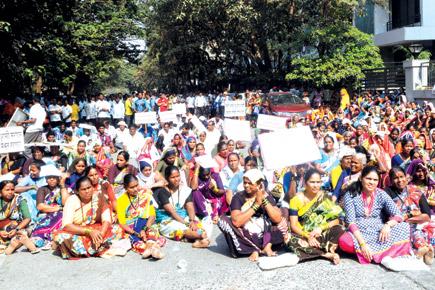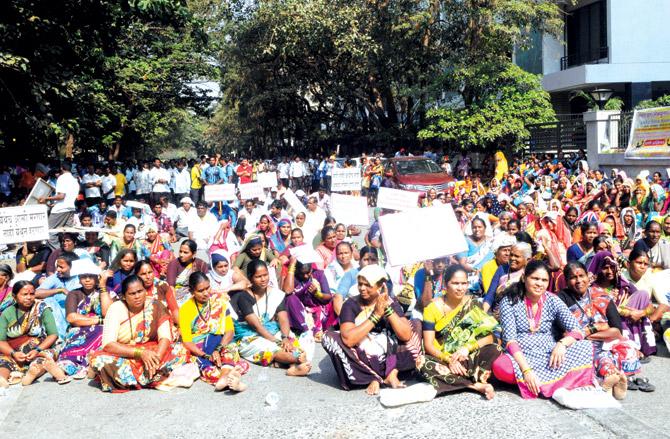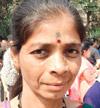Thousands gather to protest planning authority's plans that were okayed without listening to objections of the lives and livelihoods they will affect

After the protest, the community leaders and activists met with MMRDA officials, who agreed on providing them an extended period till April 25 to put forward their objections

After the protest, the community leaders and activists met with MMRDA officials, who agreed on providing them an extended period till April 25 to put forward their objections
ADVERTISEMENT
Thousands gathered near the new MMRDA building in BKC yesterday, to protest against the Manori Gorai Uttan Recreation Plan and Mumbai Metropolitan Regional Plan (2016-2036) which is going to affect lives and livelihoods of several coastal areas, namely Vasai Virar, Palghar, Dahanu, Murbad, Pen, Panvel (Raigad district) and Murbad, thus displacing the Adivasis, Kolis and farmers from their land of many generations.
Though the fight for rights of the communities living in the affected areas has been going on since the announcement of the plan in 2016, a protest was held yesterday because MMRDA did not give the communities enough time to raise objections about the project. "The English version of the development plan was notified in September, which got translated into Marathi on December 26 after an agitation. The objection time for it was only till mid-January, which angered the community, since drafting of the objections takes time. We are here to demand time till April," said Mukta Srivastava from the Soshit Jann Andolan.
The plan, according to the communities, will make way for smart cities and recreational centres, bringing the 'concrete' to the jungle. "We have been living here much before the cities came up. Now to make way for the luxuries of the upper class, we will have to lose that one thing we have: our livelihood. We cannot survive in the city, we have never lived away from the coast, we will fight till our capacity," said Tai Agivale (40) from the Gorai Suvidha Machi Vikrita Seva Sangha.
MMRDA has been undemocratic in its approach of planning the project, allege activists. "Right from drafting of the plan to communicating it to the affected people, everything has been done behind closed doors. They first drafted it in English and put it up on the site, which is not accessible to the villagers at all. How can they suggest objections when they don't understand what is happening?" said Srivastava.
Not a plan for the people
"For the first time, permission has been given to build the most hazardous industries on a green zone. Huge tracks of mangroves have been shown as urbanisable. If green zones are designated with building of hazardous industries, it shudders one to think what will come in the industrial zones. A development plan is for people, it's made of hopes and aspirations, but a plan that solely caters to the builders needs, where decisions are taken without even consulting people is not a plan made for people," said activist and architect Chandrashekhar Prabhu.
Throwing light over how MMRDA's 'hurried' approach is because of the foreign investment in these projects, activist Ulka Mahajan said, "The process is not democratic at all. It is completely hurried in the way it functions because of the foreign direct investment by countries that are pressurizing the government. Hence, they are not consulting the common people either; it will waste their time."
MMRDA relents
After the protest, the community leaders and activists met with MMRDA officials, who agreed on providing them an extended period till April 25 to put forward their objections. A Uma, chief of the Planning Division, said, "We have taken into account the objections of the public and we will examine it. An announcement regarding the same would be made in a couple of days."
Voices
Tai Agivale, Gorai Suvidha Machi Vikrita Seva Sangha 'We cannot survive in the city, we have never lived away from the coast, we will fight till our capacity.'
'We cannot survive in the city, we have never lived away from the coast, we will fight till our capacity.'
Dilip Dhake, Adivasi community 'We want to raise our kids where we have been raised. This is our habitat, the development plan doesn't cater to our needs at all.'
'We want to raise our kids where we have been raised. This is our habitat, the development plan doesn't cater to our needs at all.'
Pramila, Koli community 'We don't live like the families in the city do. We don't close our doors; we live and grow as a community. Once the culture gets mixed, we won't have any identity.'
'We don't live like the families in the city do. We don't close our doors; we live and grow as a community. Once the culture gets mixed, we won't have any identity.'
 Subscribe today by clicking the link and stay updated with the latest news!" Click here!
Subscribe today by clicking the link and stay updated with the latest news!" Click here!






